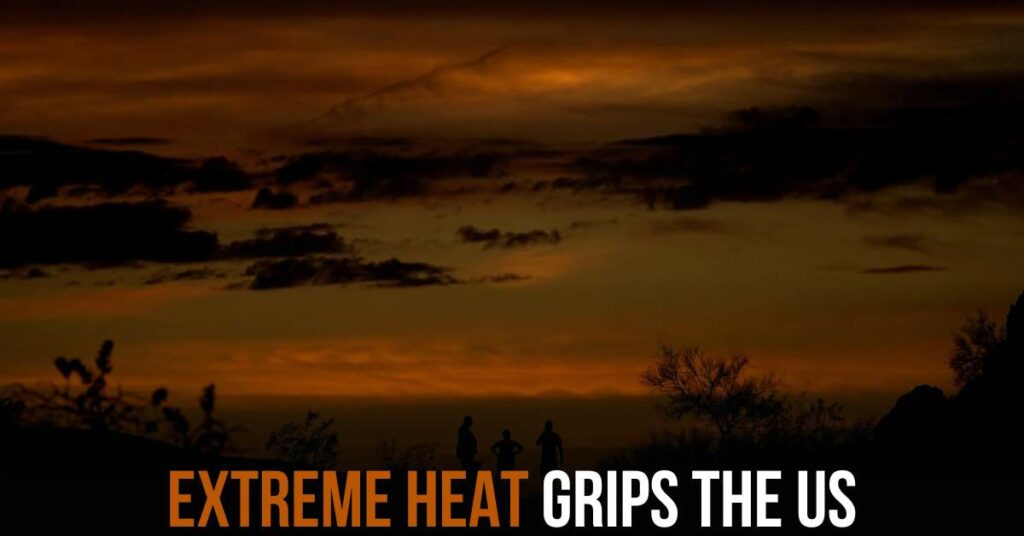As the summer heat intensifies, the United States faces a relentless wave of extreme temperatures and wildfires, posing significant challenges to both residents and emergency responders. Phoenix, Arizona, sizzled through its 31st consecutive day of temperatures exceeding 110 degrees Fahrenheit (43.3 Celsius), while other regions across the country also grappled with record-breaking heat on Sunday.
July is proving to be exceptionally steamy, with meteorologists predicting it will be the hottest month ever recorded, marking an unprecedented milestone in human civilization. The World Meteorological Organization and the European Union’s Copernicus Climate Change Service have already declared July a month of record-breaking temperatures.
The lower Southwest U.S., including Texas, New Mexico, Arizona, and parts of California’s desert, has experienced a historic heatwave since late June, subjecting large portions of the population to extreme and dangerous temperatures.
In addition to the scorching heat, wildfires continue to rage across California’s Mojave National Preserve and other regions, fueled by erratic winds. The York Fire, which ignited near the remote Caruthers Canyon area, has spread rapidly, charring over 110 square miles (284 square kilometers) of desert landscape. Authorities report no containment of the blaze, and although structures are not immediately threatened, the impact remains significant.
The tweet below verifies the news:
Phoenix sizzled through its 31st consecutive day of at least 43.3 degrees Celsius on Sunday. https://t.co/61W9a9loTP
— CP24 (@CP24) July 31, 2023
Meanwhile, the Bonny Fire in Riverside County prompted evacuations for over 1,300 residents near Aguanga, California. Firefighters are working tirelessly to control the blaze that has consumed approximately 3.4 square miles (8.8 square kilometers) of rugged hills.
Amidst the rising temperatures, the poorest Americans and people of color are disproportionately affected, often lacking access to air conditioning, which has become a matter of survival during heat waves. Climate change exacerbates the severity and duration of heat waves, leading to dozens of heat-related fatalities across the country. Last year, all 86 indoor heat-related deaths occurred in uncooled environments, emphasizing the urgency of addressing these disparities.
In Phoenix, slight relief may come in the form of expected seasonal thunderstorms that could lower temperatures temporarily. Meteorologists anticipate a brief respite from the relentless heat with temperatures hovering around 108 degrees Fahrenheit (42.2 Celsius) early in the week. However, temperatures are predicted to climb back to 110 F (43.3 C) by Wednesday and reach a staggering 115 F (46.1 C) by the end of the week.
Las Vegas, too, is grappling with near-record temperatures for July, inching closer to its 2010 record for the average of high and low temperatures each day, standing at 96.2 F (35.5 C).
As the eastern U.S. also faces soaring temperatures, the Midwest, Northeast, and Mid-Atlantic regions are experiencing some of the warmest days of the year so far, adding to the concerns over the effects of extreme heat on human health and the environment.
With climate change driving unprecedented weather patterns, communities nationwide must prioritize adaptation and mitigation efforts to safeguard against the adverse impacts of extreme heat, wildfires, and their disproportionate effects on vulnerable populations.
Click on the following links for more news from the California Examiner:
- A 3-year-old Driving a Golf Cart Fatally Strikes and Kills Another Child
- Tragic Crash in New Mexico: Small Plane Hits Home, Pilot Dead
Get ahead of the curve by accessing breaking news and insightful articles on californiaexaminer.net – start exploring today!
